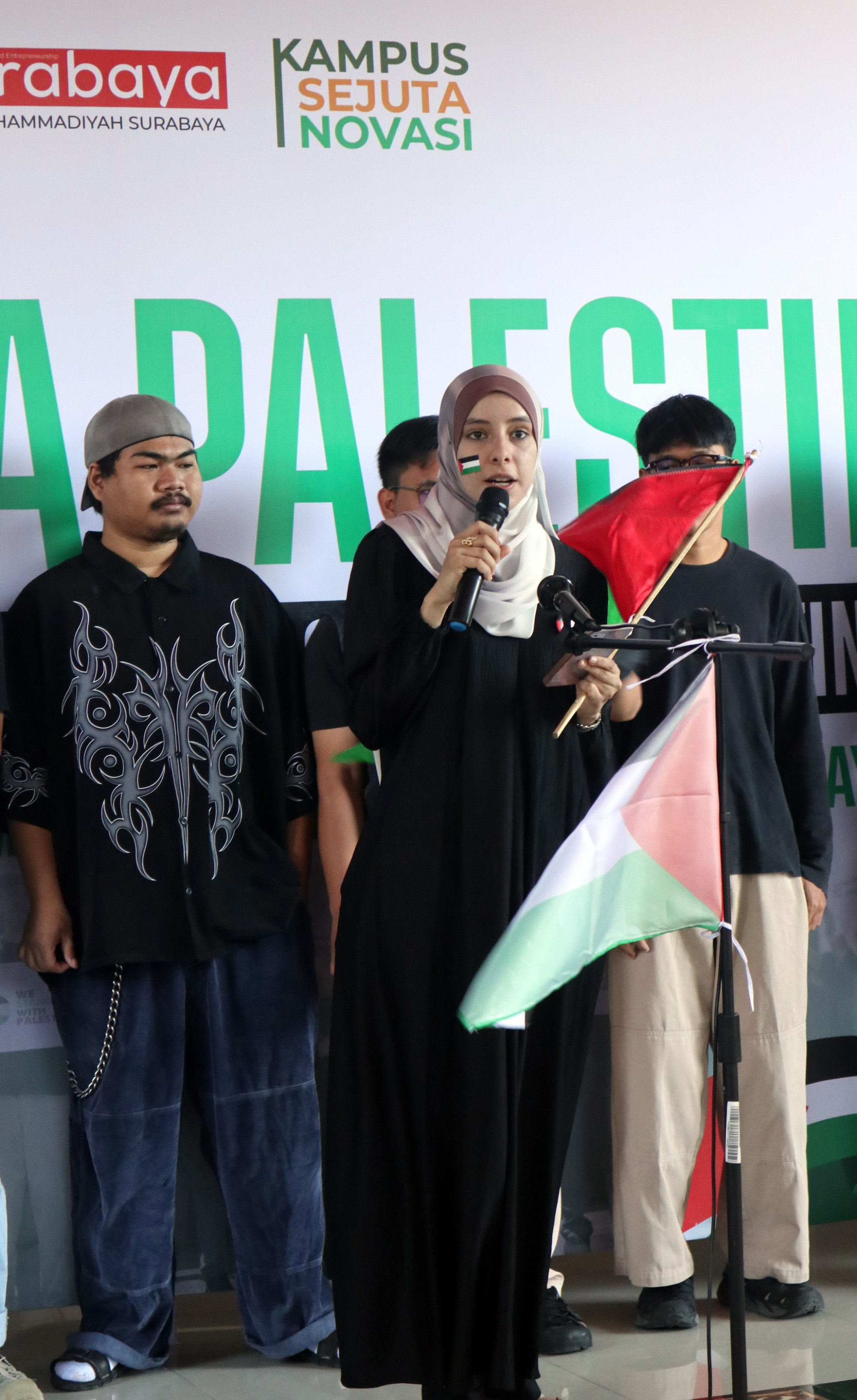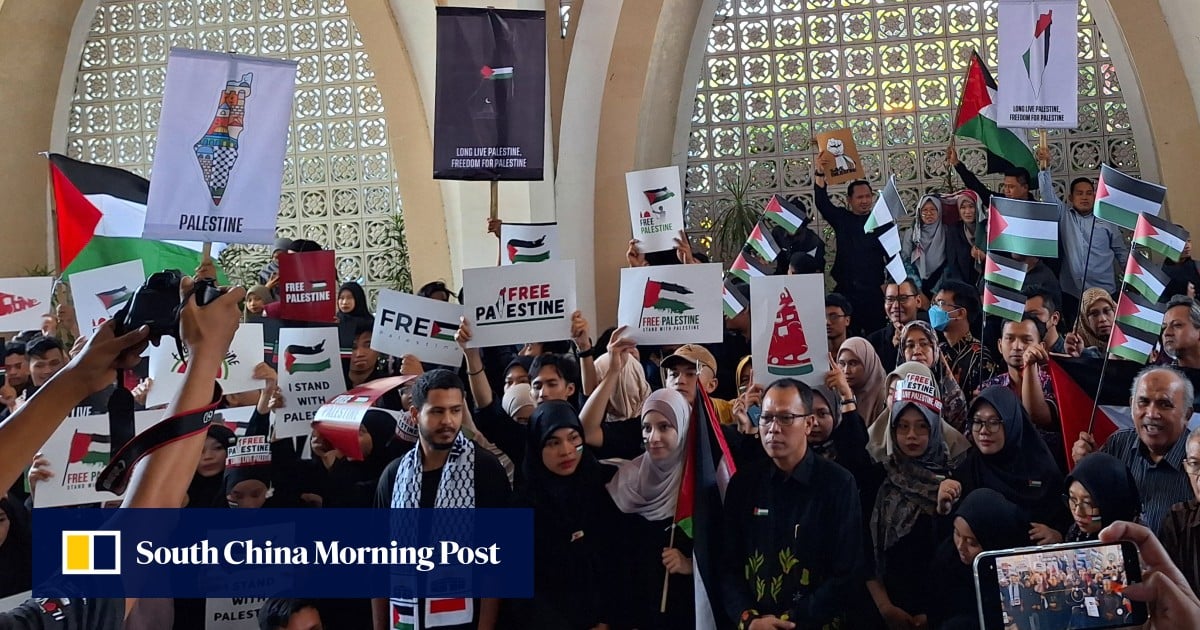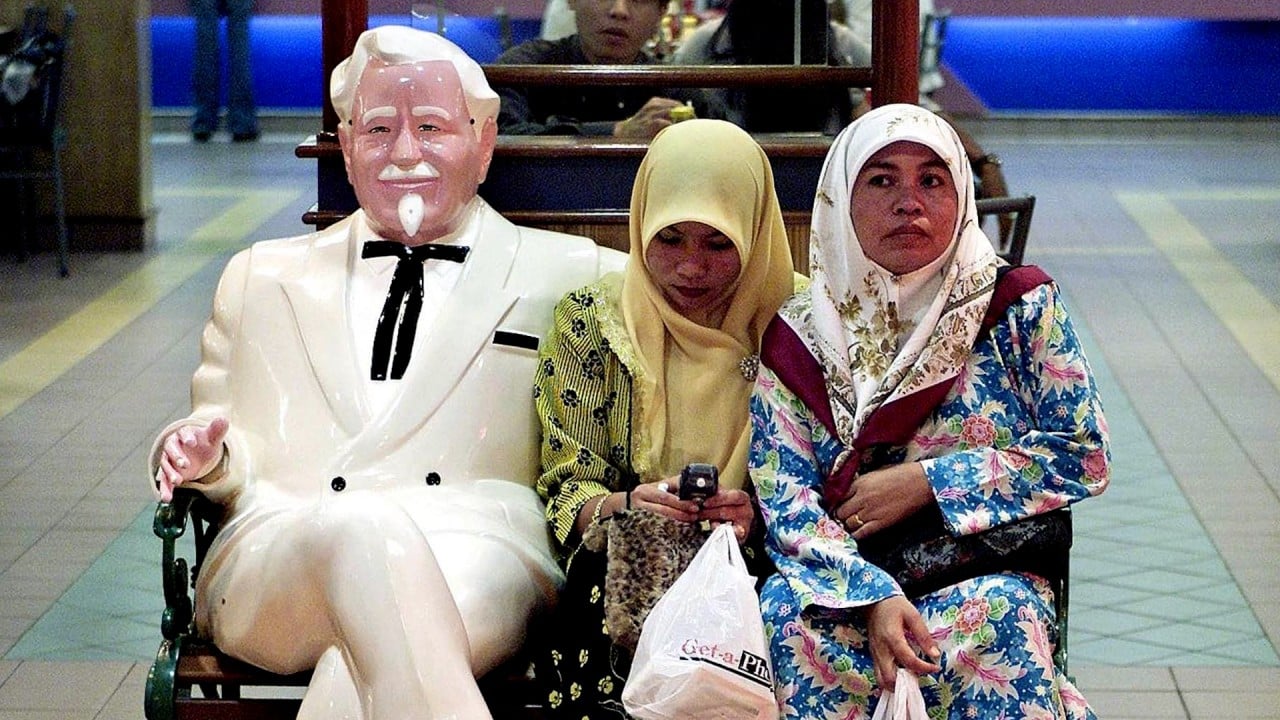“We ask the UN to facilitate an immediate ceasefire between Israel and Palestine,” Dr Ma’ruf Sya’ban, vice-chancellor of the University of Muhammadiyah Surabaya, told protesters at his campus on Tuesday.
“We strongly condemn Western countries like the US, the UK, France and Germany for their continued support of the Zionist state of Israel.”
Pro-Palestinian student protests have erupted in the US and other parts of the world including Australia, Canada, France, India and the UK. The organisers of the latest campus protests in Indonesia said they were influenced by their example.
“We chose to act in solidarity with students elsewhere who are sick and tired of Israeli atrocities against Palestinians,” said Wahyudi Kholilullah, president of the executive board of students at Surabaya’s University of Muhammadiyah.
“Our hope is for other Indonesian universities to follow suit and hold their own (pro-Palestinian) protests,” Wahyudi said.
But in addition to Israel and the usual Western targets, the Muhammadiyah rallies also took aim at Muslim organisations that protesters feel have not been doing enough.
Professor Ma’mun Murod Al Barbasy, chancellor of the University of Muhammadiyah Jakarta, claimed the 10-point demands made during the protests were “fair” because they were critical of all stakeholders in the conflict.
“Apart from Israel and its allies, we also condemned the Muslim World League (MWL), the Organisation of Islamic Cooperation (OIC) as well as Arab countries that have acted feebly against Israel.”
Among their 10 demands, the protesters issued a warning for the Indonesian government against “any attempt to pursue or normalise diplomatic relations with Israel.”
Radityo Dharmaputra, a lecturer in international relations at Surabaya’s University of Airlangga, said the Indonesian university protests “distinctly stood out” among similar protests because they were “institutionally sanctioned” by Muhammadiyah.

“So far, I haven’t seen NU (Nadhatul Ulema, Indonesia’s largest Muslim organisation) do the same thing.”
According to a 2021 estimate, NU had 95 followers in Indonesia while Muhammadiyah ranked second with 60 million.
Both NU and Muhammadiyah are also significant players in Indonesia’s higher education system.
NU operates 274 institutions of higher education, while there are 176 under Muhammadiyah. NU-affiliated higher education institutions had around 250,000 students in 2021, while Muhammadiyah had more than 500,000.
Wahyudi said the protests were also meant to “send out a powerful statement” and “keep up the momentum” for Indonesia’s support for Palestine.
“We can’t let the Palestinian issue slide away from public consciousness. People need to be reminded all the time that the struggle is far from over.”
He also said the on-campus simultaneous protests were a “follow-up act” to the students’ protests in front of the US consulate in Surabaya last November. “We also need to keep up the pressure on Western countries like the US to stop enabling Israel to carry on the war with impunity.”
Radityo praised the students’ strategy of using public protests to “keep the issue alive” but doubted they would have an impact on Western governments.
“The real problem lies with Israel’s intransigent attitude. Even its allies have shifted their stance and called for cessation of hostilities, but their entreaties have fallen on deaf ears in Tel Aviv.”
While many Indonesians are fervent proponents of Palestine, not all share the same sentiments on the issue.
Willy Harahap, 20, a non-Muslim student at a private university, said that while he prayed for peace in Gaza, he would not join any pro-Palestinian rally any time soon.
“The war is taking place thousands of miles away from Indonesia. Why get worked up over it? We have our own problems at home with discrimination against minority groups and intolerance.”
He cited an incident that occurred on Sunday in which a group of Catholic students in South Tangerang, just outside the capital of Jakarta, were attacked by local residents for praying in their own home. Three students reportedly suffered machete cuts during the raid.
“We have our own conflicts here to solve. Why not tend to our own problems first?”
Meanwhile, the boycott of Israeli-affiliated products remain strongly supported by Indonesians, which have reportedly taken a significant economic toll on the targeted businesses.
YUM, the parent company of the brands Pizza Hut, Taco Bell and KFC, reported in early May a global drop in sales ranging from two to seven per cent. Pizza Hut Indonesia also claimed a loss in sales due to the boycott in December, but did not specify how much.
Unilever, a producer of consumer goods and beauty products, announced in February their sale in Indonesia had fallen by 17 per cent due to the boycott.
“I feel thoroughly vindicated that my efforts contributed to this result,” said Puspa Retnowati, a 43-year-old homemaker in Surabaya who has been supporting the boycotts. She said she would continue to refrain from buying the targeted products until the day Palestine gains its independence.

Tuesday’s rally at the University of Muhammadiyah campus in Surabaya became emotionally charged when several Palestinian students, who were attending the school on scholarships from the Indonesian government, took to the stage to read out poems describing the desolation of Gaza.
Palestinian student Sondos Jehad Shnewra said she had personally witnessed six instances of Israeli brutality against Palestinians while growing up.
“It’s a real genocide, what the Israeli soldiers are doing in Gaza right now, as Palestinians are forced off their lands.”
She said she was grateful to her fellow Indonesian students and lecturers at the university who organised the rally.
“I hope Palestine becomes independent soon and that Indonesian Muslims will then be able to pray freely at the Al Aqsa [Mosque] with us.”
According to the Palestinian Health Ministry, at least 34,844 people have been killed by Israel’s attacks on Gaza since the start of the latest conflict, with most of the reported casualties being civilians, including large numbers of women and children.



